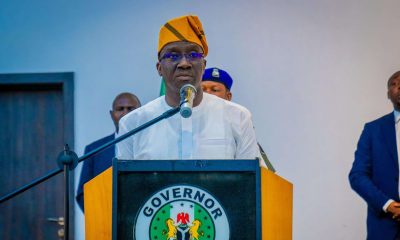Business
As CBN, NNPC tango over Nigeria’s dollars…
Published
4 years agoon
By
Publisher
By Marcel Okeke
As President Muhammadu Buhari-led Federal Government is getting into the very last lap of its tenure, Nigeria’s public sector space is getting saturated with issues ranging from the absurd to the ridiculous. The raging controversy between the Central Bank of Nigeria (CBN) and the Nigerian National Petroleum Company (NNPC) Limited over who (among the two) was responsible for the continuing paucity of dollars and hence, the plummeting of the exchange rate of the Naira, is one of such noisome features of the Administration. Indeed, as the fiscal profile of the country gets drearier in the twilight of the Administration, almost all key actors on the fiscal and monetary authorities’ seats have literally come to their wits end and now easily resort to weird experimentations in the name of policy initiatives. Call it panic measures, and you will not be wrong!
For so long, key ministries, departments and agencies (MDAs) of the Government seemed to be working at cross-purposes or in ‘silos’ such that outcomes of policy initiatives of some MDAs act as counterpoise to those of others. And so, recently, as the value of the Naira vis-à-vis the dollar was crashing almost irreversibly, the apex bank issued a statement, putting the blame squarely on the NNPC’s “refusal to remit dollar inflows to the CBN.” Specifically, the CBN said NNPC and its subsidiaries had not been remitting dollars to Nigeria’s foreign reserves, and this has caused shortage of foreign exchange in the domestic market. In a statement titled “The forex question in Nigeria: Fact sheet,” the CBN revealed that the NNPC’s remittance from crude oil accounts for over 80 percent of Nigeria’s foreign exchange (forex) earnings; so, failure to remit as usual was direct invitation to crises.
The apex bank said further that it could not solely manage the Naira collapse with its monetary policies (since it doesn’t print foreign currencies) and so, the non-remittance of forex by the NNPC and its subsidiaries “significantly limit the availability of forex in the nation’s foreign reserves.” But no sooner this claim was made than the NNPC issued a comprehensive rebuttal—detailing its remittances to the appropriate coffers of the Federal Government during the period under reference. Indeed, NNPC’s rebuttal data showed that it remitted US$2.7 billion into its accounts with the CBN from January to June 2022. A breakdown of the remittances show that US$645 million was for dividend paid by the Nigerian Liquefied Natural Gas Company Limited, while US$1.786 billion was from the NNPC’s operational activities.” The national oil company went further to give a month-by-month breakdown of the remittances.
Howbeit, rather than assuage or stem the slide of the Naira exchange rate against the dollar and other foreign currencies, the claims and counterclaims by the CBN and the NNPC exposed the lack of team spirit among the Federal institutions. It vividly reveals the lack of common agenda and absence of an overarching economic development roadmap—from which all functionaries ought to derive their goals. Over the years, even before the multifarious local and global headwinds that are blowing against the Nigerian economy, the CBN had blamed a multitude of actors and issues for the weakening Naira. For instance, in 2018, the apex bank’s boss blamed the biting foreign exchange crisis at that time on the importation of items he said should have been manufactured in Nigeria, leading to the ban on forex allocation for 41 items.
Last year, the CBN Governor shifted the blame for Naira slide to Bureaux De Change (BDC) operators, who he accused of illegal forex trading. He had specifically pointed fingers at ‘Aboki FX’, saying its activities were responsible for the Naira’s depreciation, thereby cutting allocation to BDCs. And ever since then, official forex allocations to BDCs had ceased. Earlier this year, the CBN blamed the lingering forex crisis on money laundering and activities of those allegedly funding terrorism, as well as politicians who do everything to ‘dollarize’ the Nigerian economy. And just a few days ago, August 3, 2022, the apex bank blamed the entire organised private sector (OPS) for the crashing local currency. Head, Banking Services of the CBN, Egboagwu Ezulu, said the “OPS have a problem repatriating the foreign currencies, as they prefer to keep them abroad after transactions”. Ezulu who spoke at a confab by the Association of Corporate Affairs Managers of Banks (ACAMB), blamed the non-repatriation of forex by the OPS for the scarcity of dollars and fast depleting external reserves.
Again, in the face of these blame games, it must be pointed out that the CBN-NNPC brouhaha over collapsing Naira is really a new height of the desperation over fast-depleting dollar reserves. In point of fact, huge sums belonging to many multinational organizations/companies that are meant for repatriation have been trapped in Nigeria due to paucity of forex. A few of such multinationals in the past couple of years have had to convert their accumulated dividends to more equity stakes in their (Nigerian) local units. Just last week, Middle East mega carrier, Emirates Airlines, announced that it would reduce its flights to Nigeria from August 15 2022 due to its failure to repatriate its revenue earned from ticket sales in Nigeria, now amounting to USD$85 million. The airline said it would be forced to reduce flight from Dubai to Lagos from eleven times per week to seven times per week, adding that it did not have any choice but to take this action, to mitigate the continued losses it was experiencing as a result of funds being trapped in Nigeria.
The airline made this known in a letter it wrote to the Nigerian Minister of Aviation, dated July 22, 2020. The letter explained that as of July 2022, Emirates had US$85 million of funds awaiting repatriation “due to non-availability of dollars in Nigeria and this figure has been rising by more than US$10 million every month, as the ongoing operational costs of the airline’s eleven weekly flights to Lagos and five to Abuja continue to accumulate.”
The airline said: “We simply cannot continue to operate at the current level in the face of mounting losses, especially in the challenging post COVID-19 climate. Emirates did try to stem the losses by proposing to pay for fuel in Nigeria in naira, which would have at least reduced one element of our on-going costs, however this request was denied by the supplier. This means that not only are Emirates’ revenues accumulating, we also have to send hard currency into Nigeria to sustain our own operations. Meanwhile, our revenues are out of reach and not even earning credit interest.”
Emirates Airline said it also sought solution to the forex debacle at the apex bank: “Indeed, we have made every effort to work with the Central Bank of Nigeria (CBN) to find a solution to this issue. Our Senior Vice-President met with the Deputy Governor of the CBN in May and followed up on the meeting by letter to the Governor himself the following months, however, no positive response was received. Meetings were also held with Emirates’ own bank in Nigeria and in collaboration with IATA (the International Air Transport Association) to discuss improving FX allocation, but with limited success.”
In June, IATA had disclosed that Nigeria owed foreign airlines US$450 million, representing 25 per cent of the total amount of international carriers’ funds held back by central banks of many countries put at US$1.6 billion by end of April 2022. Current estimate puts airlines’ trapped fund in Nigeria at over US$500 million, as CBN is yet to allow the airlines repatriate their funds.
While some of the airlines and other businesses are cutting down their operations in Nigeria due to the biting forex scarcity, at personal level, many Nigerians are finding it increasingly difficult to access the US dollar at the CBN’s official rate for eligible transactions. Nigerians who have need to travel abroad now experience unusual delays in accessing Business Travel Allowance (BTA), Personal Travel Allowance (PTA) and monies to pay for medicals and others. Some banks are already resorting to extending the request period for PTA/BTA from two weeks to eight weeks—a reality that compels many individuals and corporate bodies to resort to the ‘parallel market’—the bureau de change (BDCs). And as the CBN’s ‘thick skin’ indicates, the end to the acute scarcity of forex is not in sight, owing to numerous encumbrances and bottlenecks to improved foreign exchange inflow to Nigeria.
- Mr. Okeke, an economist, sustainability expert and business strategy consultant is a Columnist with National Daily Newspaper. He can be reached at: [email protected]
Trending

 Health1 week ago
Health1 week agoDeclassified CIA memo explored concealing mind-control drugs in vaccines

 Latest1 week ago
Latest1 week agoFubara pledges collaboration with APC lawmakers after Rivers by-elections

 Health7 days ago
Health7 days agoGroups launch ‘COVID Justice’ campaign, urge U.S. Senate to adopt accountability resolution

 Football7 days ago
Football7 days agoJuventus prepare €120m bid for Osimhen as summer rebuild plans gather pace

 News1 week ago
News1 week agoFamily demands coroner’s inquest into death of Chimamanda Adichie’s son

 Latest1 week ago
Latest1 week ago2027 race: ADC battles setbacks, arrests, internal strains as opposition fortunes waver

 News1 week ago
News1 week agoMother, son escape death as Lexus SUV overturns three times in Lagos

 Latest1 week ago
Latest1 week agoOkpebholo condemns attack on ADC members, vows to keep Edo peaceful

